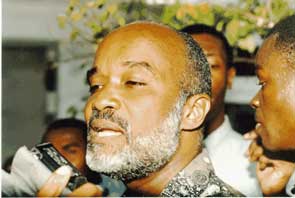Haiti Insight Volume 7, No. 3
Greg Chamberlain, Paris, France
Préval: Long on Goodwill, Short on Results
After more than a year in office, President René
Préval is no nearer to satisfying the urgent needs of Haiti's seven million people.
His appeals for patience while he tries to put into
place the structures to "modernize" the poorest country in Latin America are
angering Haitians who have even less to eat now than they did when he succeeded his
mentor, Jean-Bertrand Aristide.
Préval warned from the start that he would not be
able to deliver for some time, as he waited for a promised $500 million dollars in foreign
aid to arrive.
But the international financial institutions are
reportedly unimpressed with the government's efforts so far to make reforms ('structural
adjustment') on which much of their aid is conditional. Parliament has been slow to pass
laws enabling privatization of nine major state bodies, government bureaucracy has not yet
been reduced and there is little capacity to administer the aid. Economic growth last year
slowed to 2.8 percent.
About 7,000 civil servants in Port-au-Prince are
likely to lose their often only titular jobs over the next year. Such fears, encouraged by
opposition politicians, are producing demonstrations and strikes which could eventually
knock Préval off his tightrope. Already, the resignation of Prime Minister Rosny Smarth
is being loudly demanded.On March 26, a motion in parliament's lower house, the Chamber of
Deputies, to censure Smarth was defeated 37-29, with six abstentions
Former President Aristide, who wants to return to
power in elections in three years time, has founded his own political party, The Lavalas
Family. Aristide insists it only aims to "keep in touch with the grassroots,"
but the clan in-fighting is draining the energies of the ruling Lavalas (Creole for a
"cleansing flood") movement Aristide founded when he ran for president in 1990.
The left charges that Préval has "sold
out" to a "imperialist neo-liberal plan" that is destroying the country,
which it is says is under "foreign occupation."
The pessimists also include some of the foreigners
who, under the United Nations flag, fear that the new police force they have been
training, with mixed results, to respect human rights will fall back into deep-rooted
habits of violence once the 1,200-strong UN force pulls out of the country. Canada
declared in March it intends to keep troops in Haiti under U.N. auspicies until the end of
the year.
Although members of Préval's palace guard -- a
police unit he inherited from the Aristide Administration -- have been linked with the
murder of two opposition politicians, the present force is a notable improvement on any
other police in recent Haitian memory.
In January, street protesters around the country
accused the government of incompetence and burning barricades made a reappearance, this
time against "the people's" government.
Préval admitted things were "far from what we
would wish" and Smarth, in an allusion to the left and Aristide, lashed out at
"systematic destabilizers of the transition to democracy" trying to divide
Lavalas with their "private ambitions."
Préval said "the great challenge was to
restore the authority of the state for the good of the country." His opponents accuse
him of dismantling the state by privatization, but he has persuaded the IMF to accept a
compromise solution of joint ventures to manage national utilities, which serve only a
very small percentage of the population.
Préval has launched a modest and hastily organized
agrarian reform, especially in the fertile Artibonite Valley, under which the state seizes
disputed land and redistributes it to peasants. But lower import tariffs have seen local
produce swamped by Dominican bananas and alcohol, as well as U.S. rice, and threaten the
peasantry with ruin. Already a third of all Haitians are fed by international charities.
Other projects, such as rebuilding the country's
main roads, are beginning. Préval promises foreign investors he will make Haiti "a
vast construction site."
There is more electricity in the capital (though
still almost none elsewhere), more taxes are being collected, the currency is stable, a
number of small development projects have been started, judges are being trained and
relations have been mended with the Dominican Republic and Cuba.
Préval has ended violence by ex-members of the
disbanded army by promising them pensions. Trials of old regime figures have been set. The
press is free. Haitians can speak out. But most political parties are likely to boycott
senatorial and local elections in April. The country endured a horrific crime wave in
February and March when more than 50 people were murdered, including 8 police officers,
the Ministry of Justice's chief of security and a senator's bodyguard.
Préval has been no more successful than Aristide in
breaking the hold of the big ruling families, such as the Mevs', but he seems to have
imposed more discipline on his team in what Haitians like to call the battle to
"change mentalities."
His more energetic, straight-talking approach,
making constant visits around the country, has inspired those, especially abroad, who were
irritated by Aristide's ethereal manner and lack of interest in economic matters.
Préval is squeezed between growing public
desperation, the less than flexible demands of foreign creditors and his administration's
poor communication skills and inability to deliver much of anything. Until the means to do
so are in place, Haitians are being invited to endure the rigors of austerity Préval says
is necessary for "a better tomorrow."
He hopes they will take the strain, and not rise up
in a cycle of violence and political instability which he says would only postpone yet
again a serious reform of Haiti's economy and society.
Chamberlain is editor of Haiti-Hebdo newsletter.
|